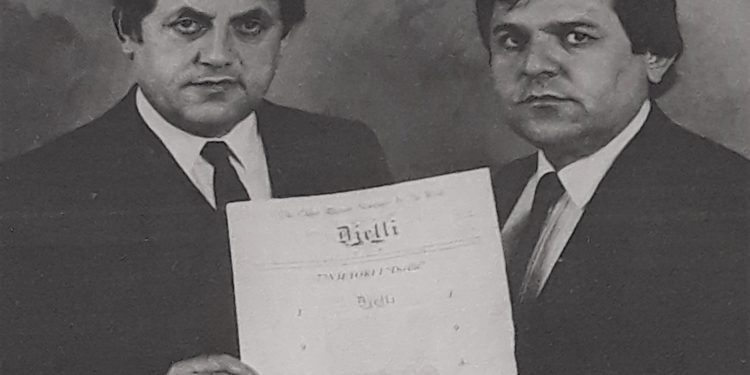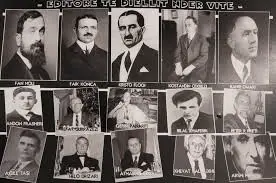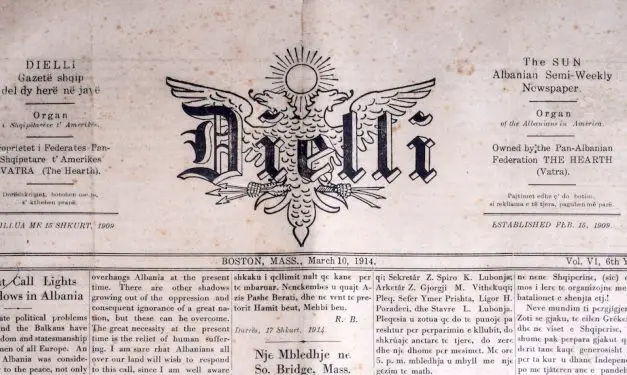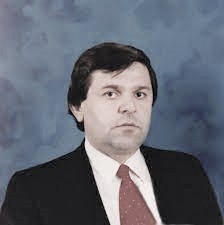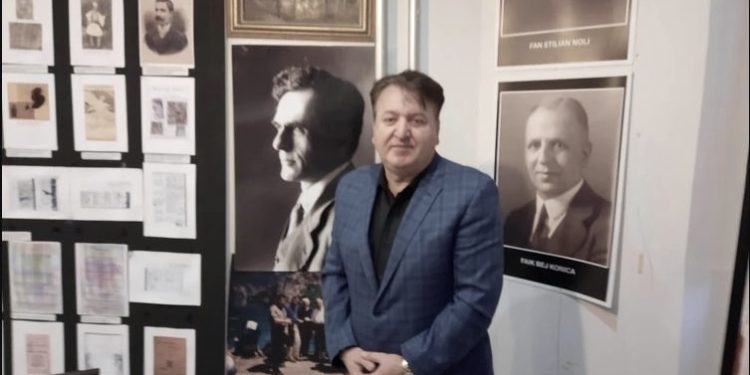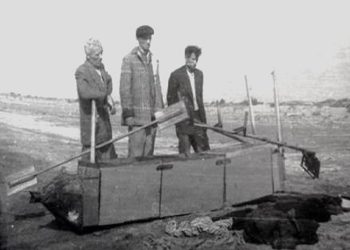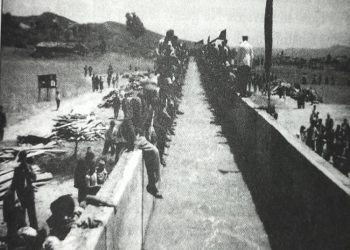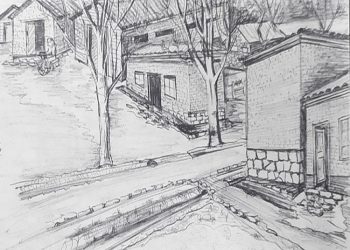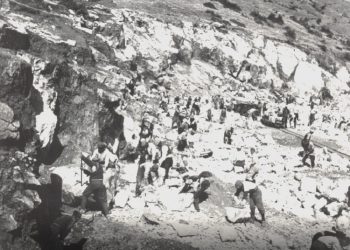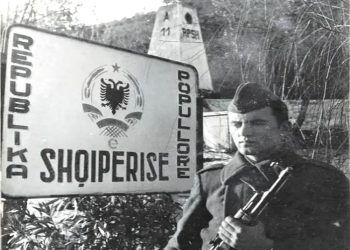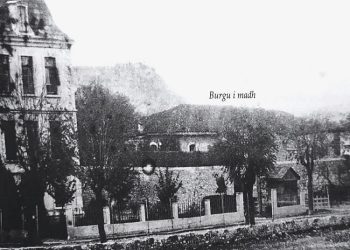By Gjekë Gjonlekaj
Memorie.al / I had learned about this great newspaper in the school of my hometown, just as I had learned about Fan S. Noli and several other Albanian-American personalities. After the fall of Aleksandër Ranković from the Yugoslav government, several monographs of Albanian poets and writers began to be published in Kosovo. In the window of a bookstore on the main street of Gjakova, several works of poets from Albania were placed, including a poem by Noli. The portraits and titles of these literary works were for us a kind of inspiration.
In literary and poetic gatherings, Kosovo Albanian actors recited Noli’s poems more than any other poet.
The cultural elite of Kosovo enjoyed extraordinary love and respect for Fan Noli. Many of them had heard his voice and comments in the Albanian Section of ‘Voice of America’, because Noli had lived until March 1965. Unlike Konica and other Albanian poets, who had been banned, Mr. Noli, however, he was honored for his national, religious and cultural activity.
The name of these two giants and the name of America were like a trinomial for Albanian generations all over the world. America for us was a symbol of freedom, democracy and prosperity. The Albanians in the Balkans were oppressed; therefore they respected America not only for its material benefits, but also for the freedom and the opportunity it had given to the Albanian-Americans to act for the benefit of the national cause.
Boston and Washington were two cities dear to the Albanian world. A few days before I left Prishtina in early January 1970, a student from Malësia asked me why he was going to America. My answer was as funny as it was prophetic.
I’m going to America: “To write for the newspaper ‘The Sun’, to speak on the ‘Voice of America’ and to become rich”? My goals were at the heights of Everest and as such, they haunted me for almost half a century.
The director of the “Voice of America” office in New York, Al Banks, wrote an article 30 years ago for the journalists of this office. Al Banks wrote extensively about me in VOICE magazine, which was an organ of this radio station. He had pointed out my three objectives, the first two achieved, but he was optimistic in his writing that he will achieve the third objective as well, seeing in me good will and serious efforts.
This magazine was spread in many countries of the world and I had received several letters especially from African countries. They had thought I was rich, which was not true, but Al Banks had predicted this, because at that time I had started investing in real estate.
The newspaper “Dielli” had another importance for me, because its editor, Dr. Athanas Gegaj was a member of my family. In the newspaper of October 1970, he made a note about our arrival in America. After a few months we started dating. He had great love and respect for “The Sun” and “Vatra”.
At the beginning of the beginning in America, we had no other connection with the Albanian world, except for the newspaper “Dielli”. At that time it was 4 pages but it was published once a week. In the mid-70s, we started serious cooperation with “Vatra”.
In New York, there were many home activists, Ymer Doda standing out. He immediately won our support and that of many highlanders from the captured Albanian lands. Ymer Doda went door to door looking for newspaper subscribers and members of “Vatra”.
Branch 29 of “Vatra” in New York was the main pillar of this organization. The 8th decade of the last century was the most historical and tragic period of the second half of the last century.
In the spring of 1981, the Kosovo uprisings for freedom and independence began. In the spring of 1982, the brothers Gervalla and Kadri Zeka were killed. At that time, Mehmet Shehu was killed or committed suicide, and Enver Hoxha died three years later.
All these events happened within a time span of 4 years. Albanian and foreign political analysts predicted major changes in the Albanian world. The Albanian nation was on the move, for freedom and democracy.
Even the Albanians of America had started their activities for the national good. “Vatra” and “Dielli” also participated here. It had become traditional for the assemblies of this organization to always be held at the end of September or at the beginning of October. The 1985 convention was held in Boston on the first weekend in October. We natives of other American cities used to go to Boston happily, because for us this city was a small Tirana.
Saint George’s Cathedral Church and the famous “Anthony Pier 4” restaurant had historical and cultural importance for Albanians. The meetings started on Saturday morning and continued all afternoon, sometimes even on Sunday before a special lunch was served at Antoni Athanas’s Anthony Pier.
The assembly of that year went well in the beginning until the moment when the secretary of “Vatra” Paulina Lukas declared that the newspaper “Dielli” is no longer published. When they heard this news, the delegates felt a pain that had never been seen in the assemblies of this organization.
Some of the attendees asked why the newspaper is closing?! Mrs. Lukas, answered; for lack of finances. Antoni Athanas was also there, but he did not react at all. The communist government of Tirana and that of Belgrade had worked day and night to close this newspaper. Both of these governments had loyal friends in America.
Albanian anti-communist and anti-Yugoslav patriots who unfortunately did not have sufficient financial opportunities, opposed this decision. “The Sun” from 1960 to 1985, had done great work against the dictatorship in Albania and against the Yugoslav occupation of the Albanian lands.
This happened in the first morning session. During the break between the two sessions, I consulted with my brother, Lucë Gjonlekaj, who was present at this assembly, about the possibility of a contribution to save this newspaper.
He steadfastly supported my position of publishing 12 8-page issues over six months beginning in January 1986. Each issue cost $950, and from January 1, 1986 through July 1 of that year, we we paid $11,400 (eleven thousand four hundred dollars).
After a while, the chairman of “Vatra”, Dr. Andrew Elia, asked for a statement from us about this contribution, even our photograph. We fulfilled his wish, explaining that our people had a great need for a serious Albanian-American newspaper.
Albania under the dictatorship and Kosovo and other Albanian countries under Yugoslav slavery, expected from us help for freedom and independence. It would have been a sin for us if we had given up on their calls for salvation. Closing the “Dielli” newspaper at that time would be a bad deed. The audience welcomed and applauded our promise, even though it seemed impossible.
Many Albanians in America welcomed this act. The editor-in-chief of “Dielli”, Xhevat Kallajxhi, published an editorial in this newspaper about this gift, describing it as the biggest gift in the history of “Dielli” and “Vatra”.
While the chairman of “Vatra” Dr. Andrew Elia, described it as a great patriotic work. Professor Repishti also congratulated us for this contribution with an article in the “Dielli” newspaper.
Other Albanians have also written and spoken about this work. During a visit to New York, Antoni Athanas congratulated me saying: “Qerrata, you kept your word, congratulations”. While our friend Prenkë Gruda said: “Congratulations, you saved the ‘Sun’ from the grave”. I have good memories of two Albanian newspapers, the newspaper “Rilindja” of Pristina and the newspaper “Dielli” of Boston.
“The renaissance died out, while the newspaper “Dielli” celebrated its 110th anniversary a month ago. God willing, this newspaper will never die out, just like the sunlight will never die out! Memorie.al
(Gjekë Gjonleka, former journalist of “Voice of America”, currently publisher in New York).




